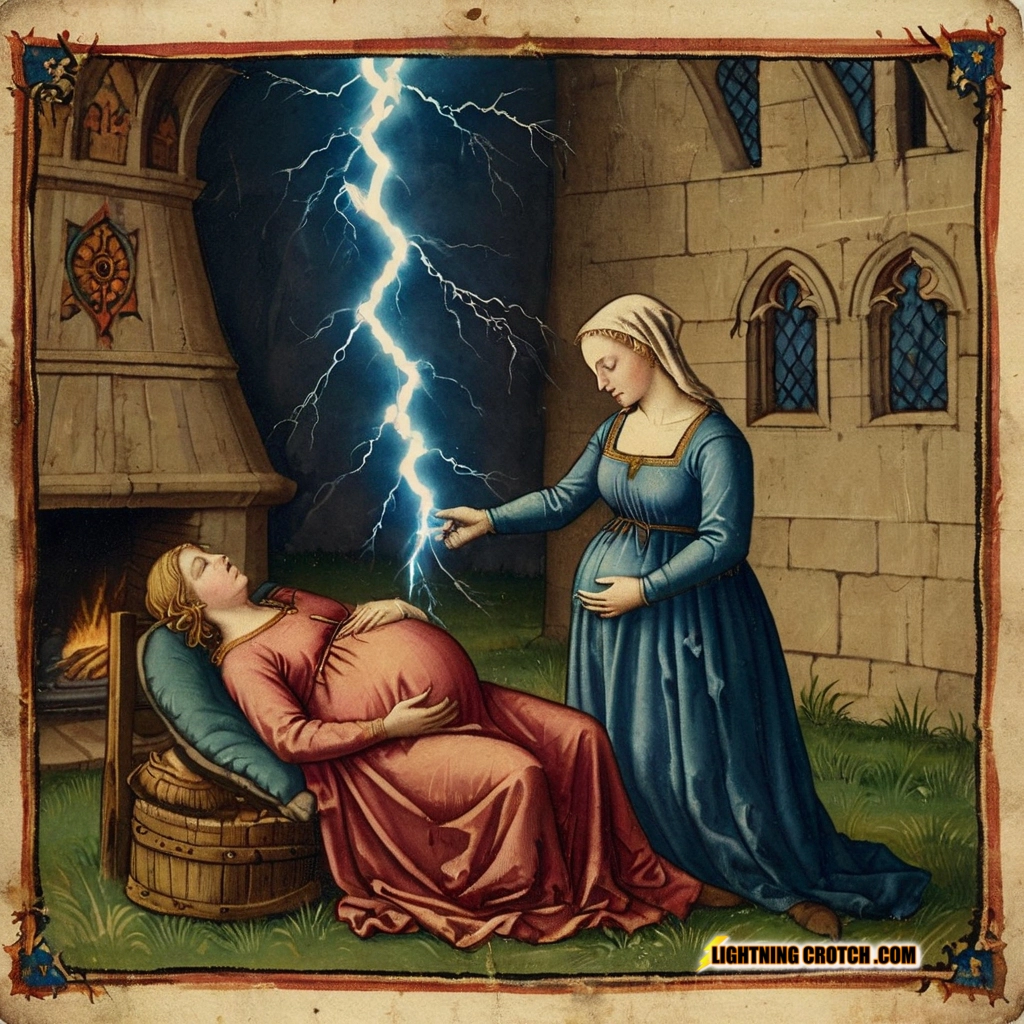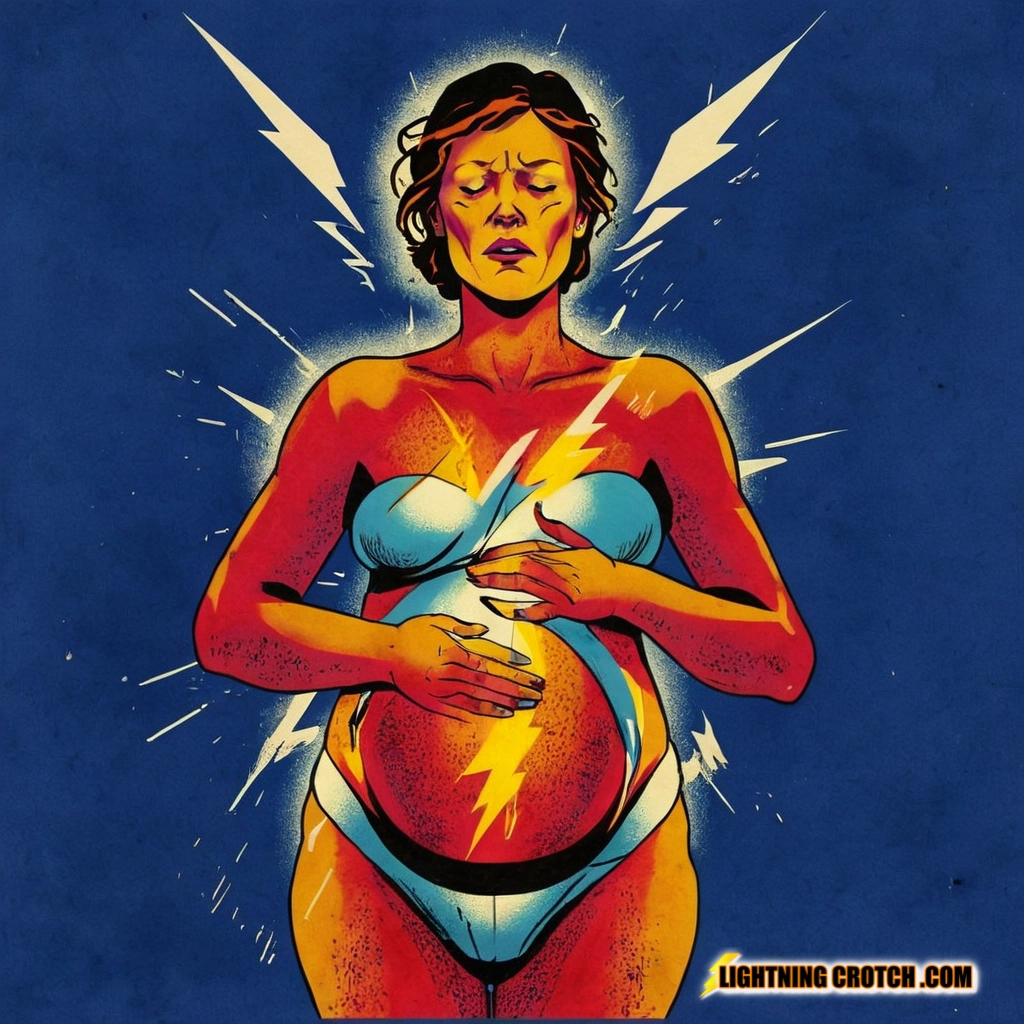Lightning Crotch: As If Pregnancy Wasn’t Hard Enough Already
Lightning crotch is an extremely painful phenomenon of that strikes (apologies for the pun) a fair number of pregnant women. If you’re pregnant and suddenly feel an unexpected jolt—like a bolt of electricity zapping you right in the pelvis—you are not alone. Many people who carry pregnancies describe this sharp, shooting pain as “lightning crotch.” The name may sound cheeky, but the sensation is very real. It can be startling, uncomfortable, and, for some, downright painful. Yet despite how dramatic it feels, it’s usually not a sign that anything is wrong.

To understand lightning crotch, it helps to unpack what’s actually happening in your body during pregnancy—an extraordinary orchestration of hormones, anatomy, nerves, and musculoskeletal shifts. Let’s walk through it step by step, with a mix of scientific clarity and the compassion you deserve as someone experiencing it.
What Is Lightning Crotch, Exactly?
“Lightning crotch” isn’t a medical term, but a colloquial phrase coined by pregnant people to describe a very particular sensation: a sudden, sharp, stabbing, or zapping pain that shoots through the pelvis, vagina, or groin. It can last just a split second or linger for a few seconds before fading.
Unlike the dull, aching discomforts of late pregnancy—think sore hips, lower back strain, or the heavy drag of swollen feet—lightning crotch is acute and electric. It’s unpredictable: one moment you’re fine, the next you’re clutching your belly, frozen mid-step because of the shockwave.
When Does Lightning Crotch Happen?
Lightning crotch tends to occur more often in the third trimester, though some people begin noticing it in the second trimester. That timing makes sense physiologically: as the uterus expands and the fetus grows heavier, your pelvic ligaments, joints, and nerves are under increasing pressure.
Some women report it most intensely in the last few weeks before delivery. Others find it flares when the baby changes position, especially if the head engages down into the pelvis (a process called “lightening” or “engagement,” which—fittingly—shares a root with the word “lightning”).
What Causes Lightning Crotch?
Here’s where science comes in. Lightning crotch isn’t caused by one single factor but rather a perfect storm of physiological changes:
- Nerve Compression and Irritation
The pelvis is threaded with a complex network of nerves, including the pudendal nerve and branches of the sciatic nerve. As the uterus grows, it can press against these nerves or stretch nearby tissues. When a nerve is stimulated suddenly, it sends a quick, intense burst of sensation—hence the zap. - Fetal Movement and Positioning
Babies are surprisingly strong, even in utero. A swift kick or roll can bump against sensitive nerves or the cervix, producing that shocking sensation. When the baby descends deeper into the birth canal, the head can put extra pressure on nerve-rich areas. - Cervical Sensitivity
The cervix itself is highly innervated. In late pregnancy, hormonal changes soften and thin it (a process called ripening). This makes it more reactive to pressure or stretching, leading to sharp pains. - Pelvic Joint Laxity
The hormone relaxin loosens ligaments throughout the pelvis to prepare for birth. While this is essential, it also destabilizes joints like the pubic symphysis and sacroiliac joints. As a result, movements—standing up, rolling over in bed, or even shifting weight—can trigger nerve irritation that manifests as lightning crotch. - Increased Blood Flow
Pregnancy dramatically increases blood volume, and the pelvic region receives a significant share. This vascular congestion can make tissues more sensitive to pressure, amplifying pain signals when nerves are involved.
What Lightning Crotch Is Not
While the sensation can be alarming, lightning crotch is generally considered a normal discomfort of pregnancy, not a danger sign. It’s distinct from other conditions you might worry about:
- It’s not preterm labor: Contractions are rhythmic, cramp-like, and often accompanied by back pain or abdominal tightening. Lightning crotch is random, sharp, and fleeting.
- It’s not an infection: Vaginal or urinary infections may cause burning, itching, or continuous pain—not sudden zaps.
- It’s not a blood clot: Deep vein thrombosis pain is usually steady, located in the leg, and accompanied by swelling.
- It’s not nerve damage: The pain is intermittent and stimulus-related, not constant or progressive.
That said, if lightning crotch is accompanied by vaginal bleeding, gushes of fluid, persistent cramping, fever, or a significant change in your baby’s movement, it’s always worth calling your provider.

Coping Strategies and Relief
You can’t always prevent lightning crotch—after all, much of it depends on your baby’s movements and nerve pathways—but you can take steps to reduce frequency and intensity:
- Change Positions: Sometimes simply shifting your weight, standing up if you’ve been sitting, or lying down on your side can ease pressure on nerves.
- Gentle Exercise: Prenatal yoga, swimming, or walking can improve circulation and relieve nerve compression.
- Pelvic Support Garments: Maternity belts or support bands lift some of the uterus’s weight off the pelvis.
- Warm Baths or Heating Pads: Applying heat to sore muscles around the pelvis may reduce sensitivity.
- Kegel Exercises: Strengthening pelvic floor muscles can provide stability and reduce the likelihood of sharp nerve tugs.
- Slow, Intentional Movements: Rising, rolling, or bending more gradually may lessen sudden jolts.
Emotional Impact
It’s important to acknowledge that lightning crotch is more than just a physical quirk—it can be emotionally unsettling. Imagine trying to walk into a meeting, or climbing stairs, or simply lying in bed, when out of nowhere you’re zapped in the most intimate part of your body. It can leave you feeling startled, frustrated, or anxious.
Many women worry that something is “wrong” when they first experience it. Others feel embarrassed to describe it out loud because of its location and the oddity of the sensation. But hearing that it’s common—and knowing the science behind it—often brings relief.
Talking openly about lightning crotch can also normalize it. Pregnancy is already full of indignities: swollen ankles, heartburn, sudden sneezes that require a change of underwear. Adding lightning crotch to the list doesn’t mean your body is malfunctioning; it means it’s adapting in extraordinary ways to bring new life into the world.
A Compassionate Perspective
When you’re carrying a baby, your body is performing daily feats of anatomical and biochemical brilliance. Lightning crotch is one of the more dramatic side effects, but it’s also a reminder of how sensitive and finely tuned your pelvic region is.
The nerves firing those zaps are the same ones that will help you push effectively during labor, guide postpartum healing, and remain part of your sensual life after pregnancy. In other words: what feels like betrayal is actually evidence of your body’s deep responsiveness.
You deserve both knowledge and comfort here. Understanding the mechanics behind lightning crotch empowers you not to fear it, and knowing it’s a widespread experience can make you feel less isolated. Meanwhile, strategies like support garments, warm baths, and gentle movement can soften its edge.
Final Word
Lightning crotch is one of pregnancy’s less glamorous footnotes—an electrifying zap that women have been experiencing and naming for generations. It’s caused by a complex interplay of fetal position, nerve stimulation, hormonal changes, and pelvic adaptation. While unpleasant, it’s usually benign and temporary.
Think of it as your body’s quirky reminder that it’s in the midst of an extraordinary transformation. You are literally housing another human being. If your pelvis occasionally protests with a bolt of electricity, it’s not failing you—it’s adjusting to a monumental task.
And soon enough, those jolts will be replaced by a very different kind of lightning: the rush of holding your baby for the first time.